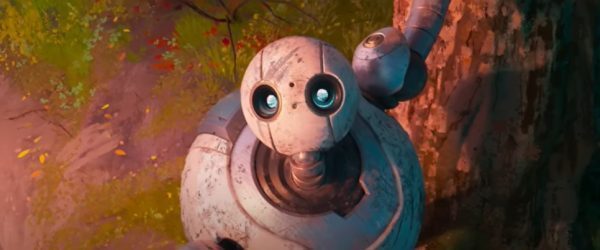As ‘The Wild Robot’ ends, our Heart pays the balance
You may have heard The Wild Robot being heralded as Dreamworks’ latest masterpiece, comparable to classic gems like How to Train your Dragon. The film’s vocal positive reception has already prompted the animation studio to confirm a sequel, much to the joy of animation fans. As for the film itself, there’s no need to preamble – The Wild Robot is both wildly enjoyable and visually enthralling, and soars to new heights thanks to a story that I’d consider among the most emotionally charged of the decade for the animation genre.
Director Dean Sanders first came in contact with Peter Brown’s original book series through his daughter and was captured by its “deceptively simple” but “emotionally complex” narrative, as he recounts to Animation Magazine. As an adaptation of a pre-existing story, The Wild Robot fits in a niche that has been particularly successful for Dreamworks in the past, which continues to produce some of its most successful films. From books like How to Train Your Dragon, to classic fairytales like Puss in Boots, this studio has a history of excelling in spinning new twists to already established fictional characters and worlds. Roz (the film’s robotic namesake), voiced by Lupita Nyong’o, and Brightbill the goose, voiced by Kit Connor, build a solid relationship that may differ in points from the original book, but retains its original genuine warmth, making audiences fall in love with their story all over again, this time in a visually mesmerizing medium.
You’d be hard-pressed not to recognize this film’s narrative of found family as deeply bittersweet and thought-provoking
Undoubtedly, this film’s emotional core is its crowning jewel, and I’d hazard to guess that most viewers will have fought (or embraced) their tears, both sad and joyful, whilst watching. The Wild Robot focuses on Roz’s unlikely survival in a remote wilderness, where she learns to care for Brightbill, an orphaned gosling, with the mischievous help of Fink the fox, voiced by Pedro Pascal. The film spends much of its runtime building up these characters and creating compelling dynamics between them, humanizing its protagonists through their flaws, quips, and believable struggles. You’d be hard-pressed not to recognize this film’s narrative of found family as deeply bittersweet and thought-provoking. Through some expertly choreographed scenes, Sanders creates real stakes which invest the audience in the relationships we’ve watched develop throughout the film’s brisk runtime.
Composer Kris Bowers, who created the film’s soundtrack, contributes to the film’s emotional core through the leitmotifs that he utilises to indicate characters, their convictions and their overlaps. When listening to the track named “I Could Use a Boost”, for example, a touching orchestration of Roz and Brightbill’s leitmotifs is used to reflect on the strength of their relationship, as their musical stems overlap and evolve. By weaving music as an essential puzzle piece to understanding the connections (or lack thereof) between characters, The Wild Robot elevates itself as a viewing experience that engages all our senses and challenges us to slow down, and listen closer.
One thing I keep coming back to with this film over other recent Dreamworks releases is its mature and thought-provoking theming. As a survival film, The Wild Robot doesn’t shy away from showing the audience the ruthlessness of nature, but its wild environments also help create many of the film’s most inspirational and even comical scenes, framing life as a gift worth our gratitude. The Wild Robot’s main theme of kindness (both towards others and oneself) as a necessary survival skill is an original take on the classic feel-good animation formula, and I appreciate that this film doesn’t focus too much on clean-cut happily ever-afters. Instead, it helps us understand a much more meaningful truth – once you’ve touched someone’s life through a kind act, you’d be surprised how much kindness that act could inspire.
This film is both a compelling drama and a funny, sweet and emotionally rich story
The Wild Robot may not be flawless, but it’s a breath of fresh air in a genre that has seemingly been very focused on middling sequels and tried-and-true formulas in the last few years. This film is both a compelling drama and a funny, sweet and emotionally rich story that knows what it wants to say and isn’t scared to delve into the complicated relationships of nature, love, and belonging. Ultimately, this film has quickly become a beloved Dreamworks story, reaching the destination it spread its very wings to arrive at, all whilst touching the hearts of many viewers along its powerful soar to success.

Comments (1)
Absolutely loved the Wild Robot, so incredibly simple yet very effective. The director did not take any shortcuts or cop-out when it came to deciding where to go with the story! Ultimately very satisfying watch!